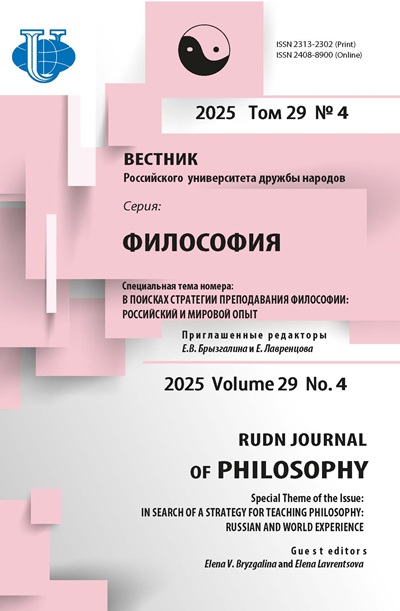Э. Кассирер и критическая этика Канта: вопрос об интерпретациях
- Авторы: Тетюев Л.И.1
-
Учреждения:
- Саратовский национальный исследовательский государственный университете имени Н.Г. Чернышевского
- Выпуск: Том 22, № 1 (2018)
- Страницы: 65-75
- Раздел: ИСТОРИЯ ЕВРОПЕЙСКОЙ ФИЛОСОФИИ И СОВРЕМЕННОСТЬ
- URL: https://journals.rudn.ru/philosophy/article/view/18142
- DOI: https://doi.org/10.22363/2313-2302-2018-22-1-65-75
- ID: 18142
Цитировать
Полный текст
Аннотация
В статье обсуждается дискуссия в немецком и англо-американском неокантианстве, затянувшаяся на долгие годы, вокруг этической теории Эрнста Кассирера. В отличие от своих учителей по Марбургской школе Когена и Наторпа, определивших этику в качестве важной составляющей части философской системы, философ не написал отдельной работы по этике. В статье проводятся параллели между этикой Когена и этикой Наторпа. Кассирер обращается к этике Канта не только с целью раскрытия специфики собственного генетического подхода и критического метода, но и пытается реконструировать ее исходные принципы - понятие автономии и понятие свободы, индивидуальной личности, ставшие отправными пунктами в системе этического идеализма. Граница между собственным познанием и мироистолкованием пролегает между бытием и должным, необходимым и возможным. Для Кассирера этическая мысль Канта становится важнейшим условием преодоления натурализма и ограниченности гносеологической программы Марбургской школы. Споры о философском наследии Кассирера, начавшиеся в 50-е гг. XX века, сегодня вновь становятся актуальными в связи с обсуждением его принадлежности к неокантианству. Переломным моментом становится эмиграция философа из Германии после установления национал-социалистической диктатуры. В англо-американской литературе этот этап в его творческой биографии определяется как культурфилософский и антропологический, полностью порывающий с наследием кантовской трансцендентальной философии. В статье выявляется собственная теоретическая позиция Кассирера, сформировавшаяся в период неокантианского влияния и специфически выразившаяся в обосновании критической этики Канта. Его конгениальность с Кантом проявляется в развитии семиотического варианта трансцендентальной философии. Обосновывается положение, что мотивы этической и критической позиции Кассирера можно встретить и в позднем этапе творчества, когда философ в «Мифе государства» раскрывает трансцендентальную историю морального сознания.
Об авторах
Леонид Иванович Тетюев
Саратовский национальный исследовательский государственный университете имени Н.Г. Чернышевского
Автор, ответственный за переписку.
Email: tetjuewl@mail.ru
доктор философских наук, доцент, профессор кафедры этики и эстетики философского факультета
ул. Астраханская, 83, г. Саратов, Россия, 410000Список литературы
- Белов В.Н. Эрнст Кассирер. Философия символических форм // Вопросы философии. 2003. № 12. С. 177-182.
- Кассирер Э. Жизнь и учение Канта. СПб.: Изд-во СПбГУ, 1997.
- Коген Г. Теория опыта Канта / пер. В.Н. Белова. М.: Академический проект, 2012.
- Пома А. Критическая философия Германа Когена. М.: Академический проект, 2012.
- Тетюев Л.И. Иммануил Кант в давосской дискуссии между Э. Кассирером и М. Хайдеггером // Иммануил Кант и актуальные проблемы современной философии / под ред. В.Н. Белова и Л.И. Тетюева. В 2 тт. М.: Изд-во «Экшен», 2008. Т. 2. C. 179-187.
- Тетюев Л.И., Шилова С.А. Миропонимающая природа языка. Проблема языка в символическом идеализме Э. Кассирера. Saarbrücken, 2011.
- Cassirer E. Gesammelte Werke. Bd. 7.: Freiheit und Form. Studien zur deutschen Geistesgeschichte. Hamburg, 2001. S. 319-387.
- Cassirer E., Heidegger M. Davoser Disputation zwischen Ernst Cassirer und Martin Heidegger. In: Heidegger M. Gesamtausgabe. Bd. 3.: Kant und das Problem der Metaphysik. Frankfurt am. Main: Suhrkamp, 1991 S. 274-296.
- Cohen H. Von Kants Einfluß auf die deutsche Kultur // A. Görland/E. Cassirer (Hrsg.): Hermann Cohens Schriften zur Philosophie und Zeitgeschichte. In 2 Bd. Berlin, 1928, Bd. 1.
- Habermas J. Die befreiende Kraft der symbolischen Formgebung // Ernst Cassirers Werk und Wirkung: Kultur und Philosophie / hrgs. vom D. Frede u. R. Schmucker. Darmstadt: Wissenschaftliche Buchgesellschaft, 1997. S. 79-104.
- Holzhey, H. Der Neukantianismus. In: Philosophie im 20. Jahrhundert. In 2 Bd. Hamburg, 1992. Bd. 1. р. 19-51.
- Itzkoff S. Ernst Cassirer: Scientific Knowledge and the Concept of Mann. Notre Dame: University of Notre Dame Press. 1971.
- Krois J.M. Ernst Cassirer: Symbolic Forms and History. New Haven; London, 1987.
- Kuhn H. The Philosophy of Ernst Cassirer // ed. Schlipp P.A. Library of Living Philosophers no. 6. 1949. Reprint. New York: Tudor Publishing. 1958. P. 70-89.
- Natorp P. Philosophie. Ihr Problem und ihre Probleme. Einführung in den kritischen Idealismus. 2 verb. Aufl. Göttigen, 1918.
- Orth E.-W. Der Begriff der Kulturphilosophie bei Ernst Cassirer // Kultur. Bestimmungen im 20. Jahrhundert. Frankfurt am. M., 1990. S. 156-191.
- Recki B. Kultur ohne Moral? Warum Ernst Cassirer trotz der Einsicht in den Primat der praktischen Vernunft keine Ethik schreiben konnte // Ernst Cassirers Werk und Wirkung: Kultur und Philosophie. Darmstadt: Wissenschaftliche Buchgesellschaft, 1997. S. 58-78.
Дополнительные файлы















